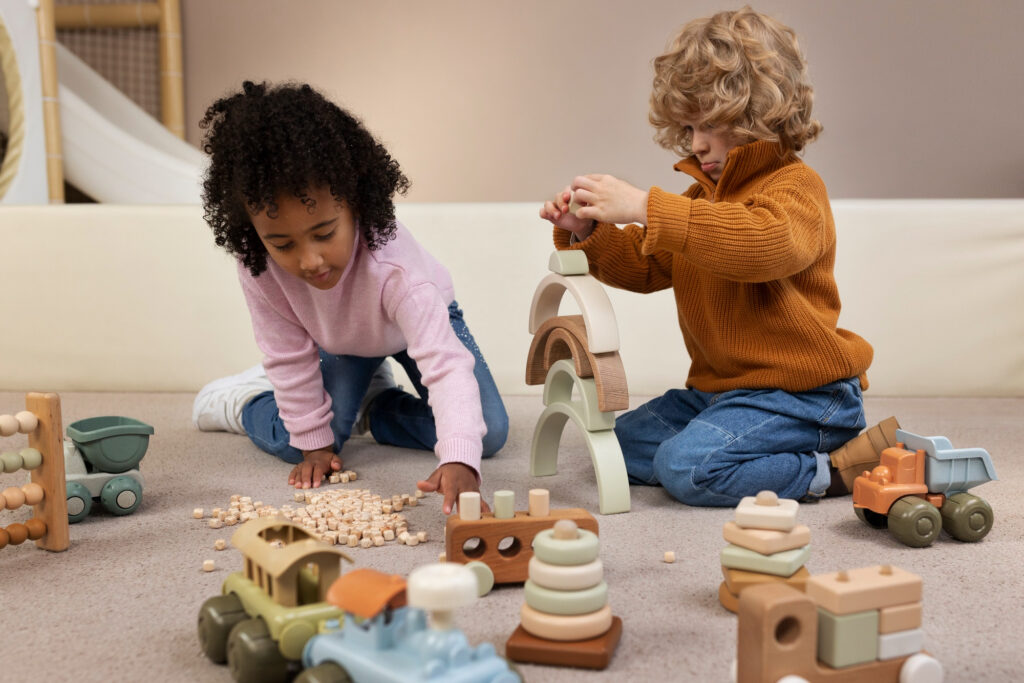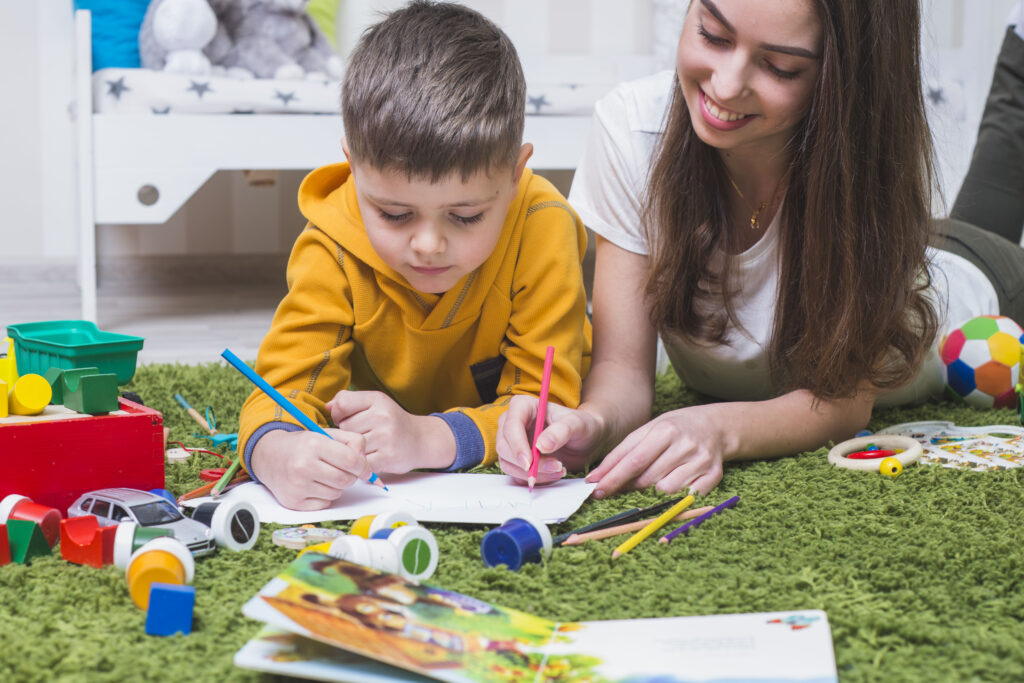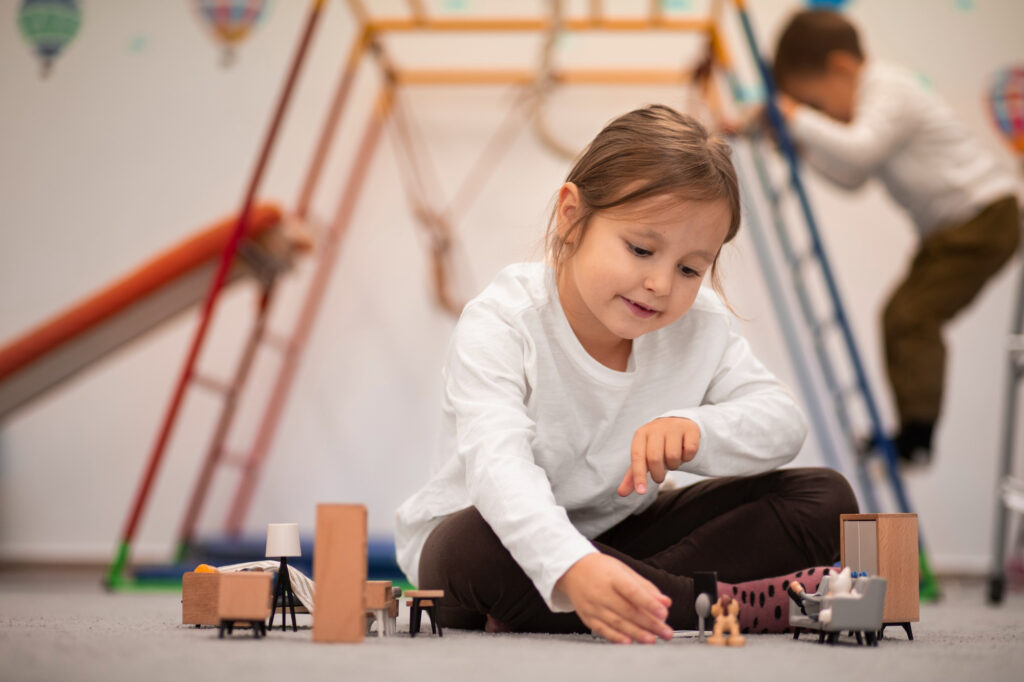
Have you ever watched your child completely engrossed in playing make-believe, building towers with blocks, or giggling as they chase bubbles? It might seem like just fun and games, but play is actually incredibly important for a child’s development.
In this article, we’ll explore the importance of play in child development and why it’s more than just a way to pass the time. We’ll delve into different types of play, how to encourage play at home, and answer some common questions parents have. So, grab a cup of coffee, cuddle up with your little one (if they’ll let you!), and get ready to discover the magic of play!
Why Play is Essential for Your Child’s Growth?
Think of play as a superfood for your child’s brain! Just like healthy food nourishes their body, play helps their mind grow and develop in important ways. Here’s a peek at the many benefits of play:
- Brain development: Play stimulates the connections between brain cells, which helps your child learn and grow. It strengthens memory, problem-solving skills, and creativity.
- Social skills: Pretend play and games with other children teach valuable social skills like sharing, taking turns, and cooperating. Kids learn how to communicate, negotiate, and resolve conflicts.

- Emotional development: Play allows children to express their emotions, process feelings, and learn to cope with stress. It can also help them build confidence and self-esteem.
- Physical development: Active play helps with gross motor skills, like running, jumping, and climbing. It also helps develop fine motor skills, like using utensils or building with blocks.
- Language development: Through play, children learn new words, practice speaking, and develop their understanding of language. Singing songs, storytelling, and pretend play all contribute to language skills.
Also Read: What is Cyberbullying and Its Impact on Children’s Mental Health? A Complete Guide
Exploring the Different Types of Play
Not all play is created equal! Here’s a look at some common types of play and how they benefit your child:
- Active play: Running, jumping, climbing, and dancing get your child’s heart pumping and muscles moving. It’s a great way to burn energy, stay healthy, and develop gross motor skills. Think tag, bike riding, or playing catch!
- Pretend play: Pretending to be a doctor, a superhero, or a chef allows children to explore their imaginations and creativity. It also helps them develop social skills and practice different roles.
- Exploratory play: This is all about curiosity and figuring things out. Babies and toddlers love exploring textures, shapes, and sounds. It helps them learn about the world around them and develop problem-solving skills.
- Creative play: Building with blocks, painting, or playing dress-up allows children to express their artistic side and explore their creativity. It also helps them develop fine motor skills and hand-eye coordination.

- Solitary play: While playing with others is important, independent play allows children to develop their imagination, self-reliance, and focus. It’s a chance for them to explore things at their own pace.
Making Play a Part of Your Day:
The good news is, you don’t need fancy toys or expensive equipment to encourage play! Here are some simple ways to make play a part of your child’s day:
- Set aside playtime: Schedule some unstructured time each day where your child can play freely without distractions.
- Get down on their level: Join in the fun! Play with your child, build towers together, or read a story together.
- Provide open-ended toys: Toys that can be used in many different ways spark creativity and imagination. Think blocks, dolls, cars, dress-up clothes, or art supplies.
- Limit screen time: Excessive screen time can cut into valuable play time. Aim for less screen time and more playtime for your child.
- Let them get messy! Let your child explore mud, paint, or finger paint. Sensory play can be a fun and enriching experience.

- Play outside: The outdoors provides a natural playground for exploration and imagination. Go for a walk in the park, jump in puddles, or build a sandcastle.
Also Read: 7 Effective Strategies For A Digital Detox: A Comprehensive Guide
Common Questions About Play:
- What if my child doesn’t seem interested in playing?
- Some children might need a little encouragement. Start with simple activities and follow their lead. Offer suggestions, but let them choose how they want to play.
- Is all screen time bad?
- Not necessarily! Educational apps and games can have some benefits. However, it’s important to limit screen time and prioritize active and creative play.
- How much play is enough?
- There’s no magic number of hours for playtime. The best approach is to let your child’s natural energy and interests guide you. Here are some general guidelines:
- Babies and Toddlers: Most of their waking hours should be spent in unstructured play. This allows them to explore their surroundings, learn new things, and develop their skills.
- Preschoolers: Preschoolers still need plenty of playtime, ideally several hours a day. This can include a mix of active play, pretend play, creative play, and solitary play.
- School-aged children: While their schedules get busier with school, play is still important. Aim for at least an hour of unstructured playtime each day.
Remember, play should be fun! Don’t turn playtime into a stressful learning experience. Focus on creating a joyful and engaging environment where your child feels comfortable and supported to explore their imagination and creativity.
The Final Word on Play
Play isn’t just a fun way to pass the time; it’s a crucial part of your child’s development. Through play, children learn, grow, and develop the skills they need to thrive in life. So, put away the electronics, grab some building blocks, and get ready to join in the fun!
Here are some additional resources you might find helpful:
- The American Academy of Pediatrics: The Power of Play: A Pediatrician’s Guide to Enjoying Play Time With Your Child [https://www.aap.org/]
- The National Association for the Education of Young Children (NAEYC): The Importance of Play
- Zero to Three: The Power of Play: Learning Through Play [Zero To Three]
Let’s all work together to create a world where play is valued and encouraged for children of all ages. After all, happy and playful children grow into happy, healthy, and well-rounded adults!
The Importance of Play in Child Development: FAQs
- Isn’t learning more important than play?
While learning is important, play is actually a powerful tool for learning! Through play, children explore concepts, solve problems, and experiment in a safe and engaging way. This allows them to learn naturally and develop a love of learning that will carry them throughout their lives.
- What if my child seems to play the same way all the time? Is that okay?
Yes, it’s perfectly normal for children to have favorite ways to play. Repetition helps them master skills and explore different aspects of an activity. However, you can also gently introduce new toys or activities to spark their creativity and encourage them to explore new ways of playing.
- Is structured play, like sports teams or organized activities, just as good as free play?
Structured activities can be beneficial for developing specific skills and teamwork. However, unstructured, free play is essential for fostering creativity, imagination, and independent thinking. Aim for a balance of both structured and free play in your child’s routine.
- What about educational toys and apps? Can those replace play?
Educational toys and apps can have a place, but they shouldn’t replace traditional play. Open-ended toys that allow for creativity and imagination are more beneficial. Limit screen time and prioritize active and creative play for your child’s development.
- My child gets frustrated easily during play. What can I do?
Frustration is a natural part of learning and play. Encourage your child to stick with it and offer support without taking over. Help them break down challenges into smaller steps and celebrate their successes along the way.
- Is it okay to let my child play with other children who are a bit rough?
Some roughhousing is normal during play, especially among young children. However, it’s important to teach children about boundaries and respect. If play becomes too rough or unsafe, intervene and help them find a more appropriate way to interact.
- What if I don’t have a lot of toys or fancy play equipment?
You don’t need expensive toys to encourage play! Cardboard boxes, blankets, pillows, and everyday household items can spark creativity and imagination. Focus on providing opportunities for exploration and open-ended play.
- I’m a busy parent! How can I make time for play in my child’s day?
Even small pockets of time can make a big difference. Set aside some unstructured playtime each day, even if it’s just 15 or 20 minutes. The quality of your interaction is more important than the quantity. Get down on their level, join in the fun, and follow their lead.
- Is technology killing play?
Technology can be a distraction, but it doesn’t have to kill play. Set limits on screen time and encourage active and creative play instead. There are also some educational apps and games that can be used in moderation alongside traditional play.
- What if I’m worried about my child’s play development?
If you have concerns about your child’s play development, talk to your pediatrician. They can assess your child’s skills and offer guidance or resources if needed.

